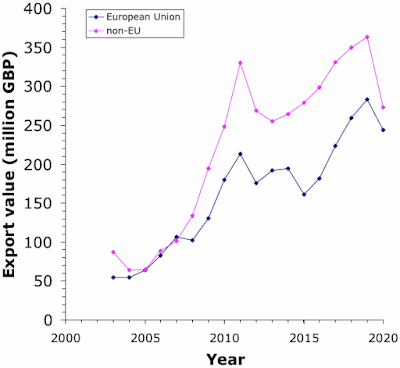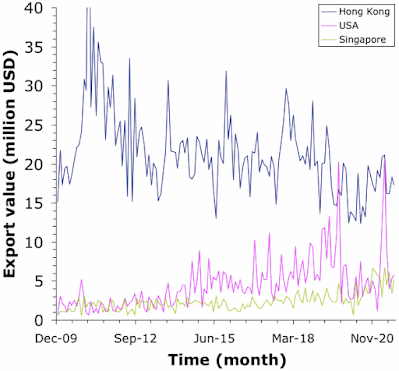When Great Britain was part of the European Union (EU), my wife used to go there regularly, for meetings of the European Medicines Agency (EMA). This organization was officially housed in London, at the time, and the representatives of the different EU countries would go there for their meetings.*
When Brexit was announced, the EU immediately arranged to move the EMA; and The Netherlands volunteered to build a new office building. This all happened before the original Brexit deadline; but nothing happened at the British end. Britain had made almost no moves to complete Brexit; and subsequently asked for an extension (just like you used to do with your reports at school). This gives you a clear idea about the enthusiasm of the Brits for Brexit — almost none at all.
Britain was a member of the EU for 47 years (1973—2020). Most people don’t know it, but their first referendum about membership was in 1975, although it was the 2016 one that counted. Since then, having voted to leave, by a very small margin (52% of the c.70% of the people who voted; UK votes to leave the EU), they have since had to live with the consequences. There was an official Brexit transition period during 2020; and their relationship is now governed by the EU-UK Trade and Co-operation Agreement that took effect this past year.**
This means that the UK moved from being the beneficiary of the EU free-trade agreements (among the member countries as well as with outsiders) to being the casualty of trade restrictions. For example, their customers in the EU must now pay import duties to receive UK wine, while UK residents have to deal with excise duties to receive EU wine (The noise and the reality); and, perhaps just as importantly, they have lost the shared labor agreement, which included seasonal workers.
There have been continual reports of just how negative the outcomes have been.*** If we look at Gross Domestic Product (= consumer spending + government spending + investment + net exports), then Brexit has been estimated to have caused a 4% reduction (How has Brexit been going?). This compares to a 2% reduction in GDP due to the current pandemic — sad, isn’t it, that the pandemic makes Brexit look good, because everyone else is also in a financial mess (eg. the GDP of the United States in 2020 was –3.4%, the biggest drop since the end of WWII).
The most obvious factor in the UK’s GDP is the loss of net trade (exports minus imports), arising from their removal from all of the free-trade agreements that the EU has in place (Brexit has been a disaster for Britain as collapsing European trade puts UK firms out of business).
One place that this effect can be clearly seen is in UK wine exports, which we will look at here. The UK has increasingly provided glowing reports of their wine exports, mainly sparkling wines (England gains foothold as sparkling wine producer). Well, as you can imagine, without trade agreements, these exports have taken a nose-dive. The data for the first graph come from Statista (Value of wine exports from the United Kingdom from 2003 to 2020). As you can see, there was a general increase in annual export value until 2019, followed by a nose-dive in 2020.**** This applies to both EU (14% reduction) and non-EU (25%) wine exports, for an overall reduction of 20% from 2019 to 2020. Ouch!
We can investigate this further by looking at some of the main countries concerned in these exports. The next pair of graphs come from the UN Comtrade: International Trade Statistics database, and refer to the seven largest export markets for UK “Wine of fresh grapes, including fortified wines” (Jan. 2010 to Sep. 2021). The first graph refers to the four EU countries, and the second graph to the three non-EU countries.
As can be seen, the monthly exports to the EU countries do take the expected further nose-dive immediately after December 2020, at the end of the transition period. The average 2021 export values compared to 2019 are: Germany 8.5%, Netherlands 25%, France 53%, and Ireland 58% (Denmark was next, at 52%). The equivalent data for the non-EU countries are: Hong Kong 99%, Singapore 155%, and the USA 83% (Japan was next, at 77%).
So, the loss of the EU markets plus the USA has decimated the UK's wine export values.
The UK now has to re-negotiate all of it's trade agreements. This is turning into a long and arduous process; although as far as wine is concerned, they now have a new agreement with Australia (Free Trade Agreement supports Australian exports to the United Kingdom), which, in turn, desperately needs somewhere to replace its China market (China slams Australian wine with 218% tariffs for 5 years).
The obvious thing for the UK to have done about the loss of their free-trade agreements would be to re-join the European Free-Trade Association (EFTA), currently consisting of Iceland, Liechtenstein, Norway, and Switzerland, Indeed, the UK actually helped found this group way back in 1960, along with Austria, Denmark, Norway, Portugal, Sweden, and Switzerland. This was when the European Economic Community (EEC) was being exclusive, and none of these countries could get in. When the EEC expanded to became the EU, only the current four of the EFTA countries did not join. However, the EU nixed this idea of the UK rejoining the EFTA; they thus need to start pretty much from square one.
Anyway, a recent survey suggests that 51% of the UK populace say they would vote for re-entry to the EU (One year on from Brexit, poll finds voters believe it has harmed UK’s interests) — it's not much of a change in percentage, but it produces a seriously different outcome.
* This was handy for me, because I had Australian wines sent to her hotel, and she then brought them back in her luggage — the UK has a broader selection of Australian wines than anywhere else in Europe.
** This has not been going well, either (The Johnson factor).
*** There are sad stories about individual companies (Brexit: ‘the biggest disaster any government has ever negotiated’); and even the schoolchildren no longer visit (‘Almost unsaleable’: slump in school trips to UK blamed on Brexit).
**** The dip in export value a decade ago was, of course, due to the global recession.






No comments:
Post a Comment